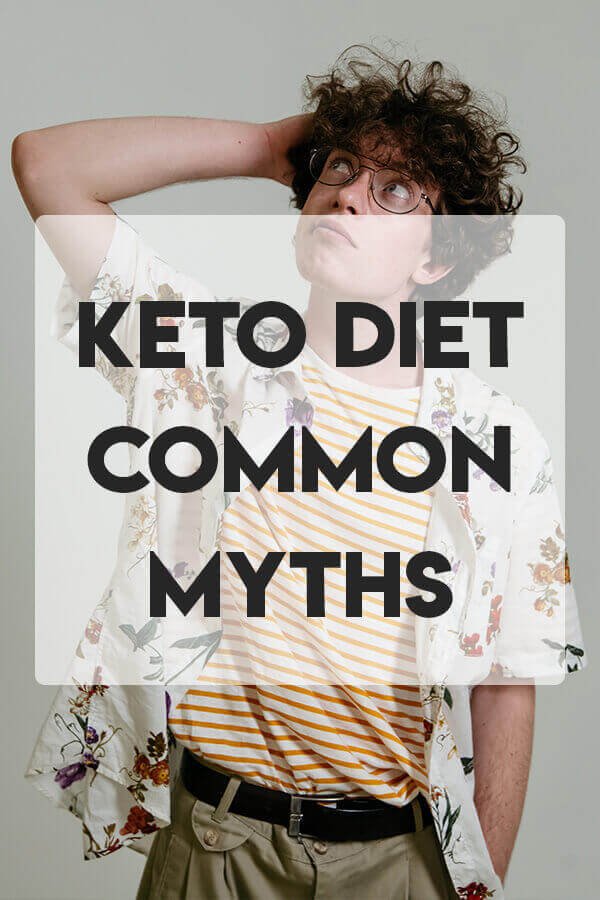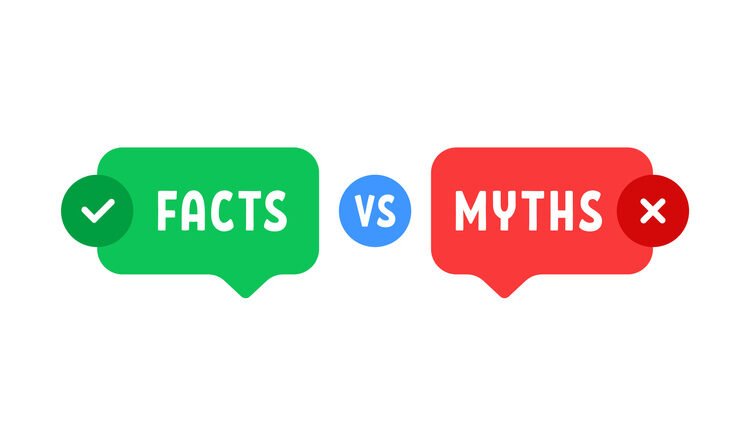Are you curious about the keto diet but hesitant to give it a try due to all the myths and misconceptions surrounding it? Well, fear not! In this article, we’ll debunk some of the most common misconceptions about the keto diet. From the false belief that it’s all about eating mountains of bacon to the misconception that it’s just another fad diet, we’ll set the record straight and give you the real facts about the keto diet. So if you’re ready to discover the truth about this popular diet, keep reading!

This image is property of perfectketo.com.
Myth: The keto diet is a high-protein diet
The misconception explained
One common misconception about the keto diet is that it is a high-protein diet. While protein is an important component of the diet, it is not the primary focus. The main goal of the keto diet is to shift the body into a state of ketosis, where it burns fat for fuel instead of carbohydrates. To achieve this, the diet emphasizes high fat intake, moderate protein intake, and very low carbohydrate intake.
The truth about protein intake in the keto diet
While protein is necessary for various essential functions in the body, consuming excessive amounts can hinder the desired metabolic state of ketosis. The body has the ability to convert excess protein into glucose through a process called gluconeogenesis, which can potentially inhibit the production of ketones. Therefore, it is crucial to consume moderate amounts of protein to maintain a proper balance between fat and protein intake on the keto diet.
Myth: The keto diet is a no-carb diet
Understanding carbohydrate intake in the keto diet
Another misconception about the keto diet is that it is a no-carb diet. While the diet does restrict carbohydrate intake to a significant extent, it is not entirely devoid of carbs. The goal is to minimize carbohydrate consumption to a level that allows the body to enter a state of ketosis.
The importance of healthy carb sources in the keto diet
Not all carbs are created equal, and the keto diet encourages the consumption of healthy carb sources, primarily from non-starchy vegetables and some low-glycemic fruits. These sources provide essential vitamins, minerals, and fiber while maintaining low carbohydrate levels. By choosing nutrient-dense carbs, individuals can ensure they are still getting the necessary nutrients while adhering to the principles of the keto diet.
Myth: The keto diet is all about bacon and butter
The misconception explained
One of the most widespread myths about the keto diet is that it solely revolves around consuming copious amounts of bacon and butter. While these high-fat foods are indeed allowed on the diet, they should not be the sole focus of the diet.
The importance of a balanced keto diet
A balanced keto diet includes a variety of healthy fats, such as avocados, nuts, seeds, and olive oil, along with a wide range of non-starchy vegetables, moderate protein sources, and low-glycemic fruits. By incorporating a diverse range of foods, individuals can ensure they are getting a good balance of nutrients while staying in a state of ketosis.
Myth: The keto diet is not sustainable
Exploring the long-term sustainability of the keto diet
Many skeptics believe that the keto diet is not sustainable in the long run due to its restrictive nature. However, with proper planning and education, the keto diet can be a sustainable lifestyle choice for many individuals.
Potential challenges and ways to overcome them
Transitioning to a keto diet may be challenging initially, as the body adapts to utilizing fat as the primary fuel source. This transition period, often referred to as the keto flu, can cause symptoms such as fatigue, headaches, and irritability. However, these symptoms are temporary, and many individuals find that they disappear once their bodies fully adapt to a state of ketosis.
Additionally, maintaining a well-rounded nutrient intake and keeping a close eye on electrolyte balance can help overcome potential challenges. Incorporating a variety of nutrient-dense foods and considering supplementation, if necessary, can ensure a sustainable and balanced keto diet.

This image is property of www.tasteaholics.com.
Myth: The keto diet lacks essential nutrients
Identifying potential nutrient deficiencies in the keto diet
Another common myth is that the keto diet lacks essential nutrients. While it is true that certain nutrients, such as fiber and some vitamins, may be limited in the keto diet, it is entirely possible to meet all nutritional requirements by carefully selecting appropriate foods.
Strategies to ensure a well-rounded nutrient intake on keto
To avoid nutrient deficiencies, individuals on the keto diet should focus on consuming a wide range of non-starchy vegetables, which are rich in fiber and various vitamins and minerals. Incorporating nutrient-dense foods like organ meats, seafood, and leafy greens can ensure the diet is nutritionally balanced.
Moreover, considering supplementation, especially for nutrients that may be more challenging to obtain on a low-carb diet, can be beneficial. Working with a healthcare professional or registered dietitian can help create a personalized plan that meets individual nutrient needs while following the principles of the keto diet.
Myth: The keto diet is only for weight loss
The diverse applications of the keto diet
While the keto diet is often associated with weight loss, it has multiple applications beyond just shedding pounds. The diet has been used therapeutically to manage conditions such as epilepsy, type 2 diabetes, polycystic ovary syndrome (PCOS), and even certain types of cancer.
Benefits beyond weight loss
Apart from weight management, the keto diet has shown promising results in reducing epileptic seizures, improving insulin sensitivity, and regulating hormonal imbalances associated with PCOS. Additionally, some research suggests potential benefits in managing neurodegenerative diseases, such as Alzheimer’s and Parkinson’s.
However, it is important to note that individual results may vary, and consulting a healthcare professional is crucial before embarking on a keto diet for any specific health condition.

This image is property of www.nashuanutrition.com.
Myth: The keto diet is detrimental to heart health
Understanding the impact of the keto diet on cardiovascular health
Another myth surrounding the keto diet is that it is detrimental to heart health due to its emphasis on high-fat foods. However, multiple studies have shown that the keto diet can actually lead to improvements in various cardiovascular risk factors.
Effects on cholesterol levels and cardiovascular risk factors
Contrary to popular belief, the keto diet has been shown to improve markers of cardiovascular health, including reducing triglyceride levels and increasing levels of beneficial HDL cholesterol. Additionally, the diet can lead to improvements in blood pressure and insulin sensitivity, both of which are crucial for maintaining heart health.
It is important to note that the long-term effects of the keto diet on cardiovascular health are still being studied, and individuals with pre-existing heart conditions should consult their healthcare providers before making any dietary changes.
Myth: The keto diet leads to muscle loss
Addressing the concern of muscle loss on the keto diet
One concern often raised about the keto diet is that it can lead to muscle loss. While it is true that the diet restricts carbohydrate intake, which is a primary source of energy for muscles, careful attention to protein intake and resistance training can prevent muscle breakdown.
Optimizing protein intake and resistance training
To preserve muscle mass on the keto diet, it is important to consume adequate protein. Including sources such as lean meats, poultry, fish, and plant-based proteins can help meet protein needs. Additionally, engaging in regular resistance training can stimulate muscle growth and prevent muscle loss.
By tailoring protein intake, resistance training, and overall calorie intake to individual needs, individuals can minimize the risk of muscle loss while following the keto diet.

This image is property of whatsgood.vitaminshoppe.com.
Myth: The keto diet causes ketoacidosis
Distinguishing between nutritional ketosis and ketoacidosis
One of the most critical misconceptions about the keto diet is that it leads to ketoacidosis, a dangerous condition primarily seen in individuals with uncontrolled type 1 diabetes. However, it is crucial to distinguish between nutritional ketosis, which is the goal of the keto diet, and diabetic ketoacidosis.
Who is at risk for ketoacidosis and how to avoid it
Ketoacidosis occurs when blood ketone levels rise to dangerously high levels, leading to severe metabolic imbalances. This condition is typically seen in individuals with uncontrolled type 1 diabetes who lack sufficient insulin. For those without pre-existing underlying conditions, nutritional ketosis achieved through the keto diet is a safe and controlled metabolic state.
To avoid any potential risks, individuals with diabetes or other medical conditions should consult their healthcare providers before beginning the keto diet or making any significant dietary changes.
Myth: The keto diet is a quick fix for all health issues
Understanding the limitations of the keto diet
While the keto diet has shown potential benefits for various health conditions, it is essential to recognize that it is not a quick fix for all health issues. Each individual is unique, and different health conditions may require personalized approaches beyond the scope of the keto diet.
The importance of a holistic approach to health
To achieve optimal health, a holistic approach that includes regular physical activity, stress management, and a well-rounded diet is crucial. While the keto diet can be a valuable tool for certain individuals, it is important to consider the overall lifestyle and individual needs to address specific health concerns comprehensively.
In conclusion, the keto diet has garnered both attention and misconceptions. By dispelling these common myths and misconceptions, individuals can gain a clearer understanding of the underlying principles and potential benefits of the keto diet. It is important to remember that a well-balanced and personalized approach to nutrition and overall health is crucial for long-term success. Consulting with a healthcare professional or registered dietitian can ensure a safe and effective implementation of the keto diet, tailored to individual needs and goals.

This image is property of blog.nemours.org.

